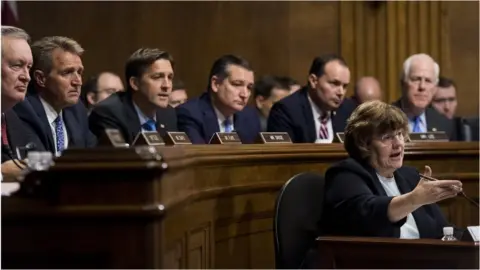Christine Blasey Ford and Brett Kavanaugh hearing: What we learned
With a seat on the Supreme Court hanging in the balance, Christine Blasey Ford and Brett Kavanaugh appeared in front of senators to state their case and share their stories.
Here are four key takeaways from a day of seldom-matched drama at the US Capitol.

An emotional opening
Everyone knew what Christine Blasey Ford was going to say before the Senate Judiciary Committee hearing on Thursday morning. Knowing what she was going to say and hearing her speak it, in a quiet, sometimes faltering voice, are two very different things, however.
For a taut 20 minutes, Dr Ford held the stage with searing emotion. She spoke of traumatic memories and decades of shame; of a civic duty to come forward; and recent months of hounding media and death threats.
During questioning from Democratic senators, Dr Ford went on to provide more memorable lines. She said she was 100% certain that Brett - referring to Mr Kavanaugh repeatedly by his first name - was the teenager who assaulted her.
She recounted how the enduring recollection she has from the incident, burned into her brain, was of Mr Kavanaugh and his friend, Mark Judge, laughing as they stumbled down the stairs after the alleged attack.
The images of her speaking - the first glimpse the public at large has had of her besides a few grainy photos - will linger well beyond Thursday's hearing or even Brett Kavanaugh's ultimate professional fate.
Her name, like that of Anita Hill 27 years before her, will be a part of American history, held up by her advocates as a talisman for a troubled time.

An inconsistent cross-examination
Thanks in large part to a disjointed format that featured five-minute segments alternating between veteran sex-crimes prosecutor Rachel Mitchell, a surrogate questioner for the Republicans, and Democratic senators, there was little flow to proceedings after Dr Ford's powerful opening.
It was as if viewers were flipping back and forth between a CourtTV criminal cross-examination and a public-access television congressional hearing.
Ms Mitchell's goal - pursued in a methodical prosecutorial fashion - was to pull at a number of threads in Dr Ford's story.
 Pool
PoolWho drove her to and from the house on the night of the party?
Why did she tell Senate investigators that she couldn't meet them in Washington because she was afraid of flying if she frequently travelled by air for pleasure?
Did she or did she not share her 2012 therapist records with a reporter from the Washington Post?
The questions seemed more geared toward undermining Dr Ford's credibility - the kind of strategy useful during depositions or trials to undermine a jury's trust in a witness or, perhaps, force them to crack under the accumulated pressure of the interrogation.
Every five minutes, however, Democrats threw Dr Ford a lifeline - and by the end of the first half of the hearing, Republicans were largely left decrying the process and not questioning the sincerity of Dr Ford's testimony.
In the end, Ms Mitchell herself seemed slightly exasperated by the format she was working under. When it comes to trying to arrive at the accurate recollection of trauma, she said, "there's no study that shows that this setting, in five-minute increments, is the best way to do that".

A response of anger and pathos
Brett Kavanaugh, when his turn to testify arrived, had his work cut out for him.
He was fighting for his professional life. He had to show it. More than that, as he fought to preserve his personal reputation - as a father, as a son and as a husband - he had to feel it.
These emotions played themselves out on his face and in his voice throughout his opening statement. He lashed out at Democrats and what he called a "grotesque and co-ordinated character assassination", warning darkly, "what goes around comes around".
When talking about his family - his parents and his children - his voice cracked and he choked back tears, pausing to take long gulps of water.
His supporters will see a man bowed but not broken, refusing to give in to those who wish to drag him down.
But his critics may see his performance as the product of wealthy private school privilege finally facing consequences for his actions.
"Is this how people get to talk if they don't spend their entire lives being scrutinised for tone?" asked Washington Post columnist Alexandra Petri in a tweet.
Whether Mr Kavanaugh struck the proper tone for his testimony will be the big question hanging over his performance. He is, after all, auditioning for a seat on the Supreme Court, where a deliberative temperament is viewed as a necessity of the job. His testimony on Thursday was something different.

Back to the partisan trenches
Donald Trump reportedly criticised Mr Kavanaugh's demure performance in his Fox News interview earlier in the week. According to the Washington Post, he was riveted and pleased by the judge's Thursday testimony. The Republican political base also will probably enjoy his more combative demeanour.
His opponents, on the other hand, are already pointing out that an angry and aggressive response to adversity isn't exactly exculpatory given the charges against him.
Mr Kavanaugh's testimony will almost certainly deepen the partisan divides already tearing the nation apart. In the short term, it probably helps the judge steady a ship that very recently seemed poised to capsize.
But will it win over on-the-fence Republican senators who may have been swayed by Christine Blasey Ford's testimony in the morning? Republican Senator Lindsey Graham, in afternoon questioning, decried the nominee's treatment at the hands of Democrats and dared Republican senators to vote against him.
If Republicans close ranks, Judge Kavanaugh will be Justice Kavanaugh by next week. It won't be long until we know his fate.
